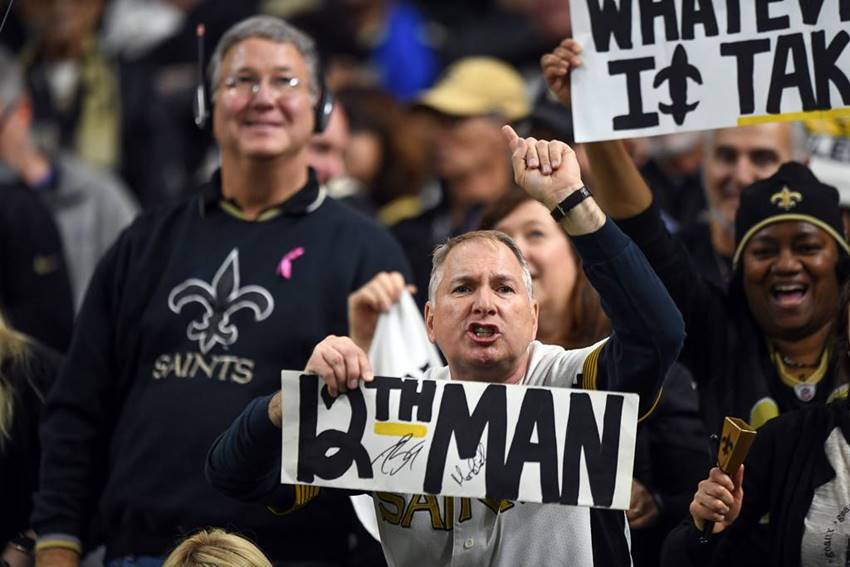The NFL is back, but not for all of us

The NFL is back.
It returned Thursday night with the Super Bowl champion Kansas City Chiefs playing the Houston Texans.
It’s back in full force this weekend, including a marquee match-up between Drew Brees and the New Orleans Saints and Tom Brady and Tampa Bay Buccaneers in the building formerly known as the Mercedes-Benz Superdome.
It has been a long time coming.
No off-season workouts, no mini-camps, closed training camps, no preseason games – all because of COVID-19 restrictions that have kept everyone quarantined to one degree or another.
Those restrictions will prevent any fans from attending the Saints-Buccaneers game, which figures to drive up the TV ratings for the marquee match-up of opening weekend.
For most NFL fans, this weekend is an overdue and desperately needed distraction from the pandemic. But some fans – including many long-time, passionate ones – are self-quarantining themselves – not from COVID-19, but from the NFL.
For them, the NFL doesn’t represent a distraction from the pandemic as much as it represents a flare-up of the political divisiveness that has run concurrently for much of the pandemic.
The passionate, controversial, hotly-debated unrest in the name of social justice reform was front and center for the NFL opener, and it will remain so throughout the weekend and for the foreseeable future.
Many fans have said they would not watch the opener or any other game.
I know of one lifelong, passionate Saints fan who turned in his season tickets recently.
He says he’s done.
Many others feel the same way.
Players kneeling during the national anthem, the pressure that led the Washington NFL team to drop its “Redskins” nickname, the allowing of helmet stickers and end-zone engravings to express a political point of view have all contributed to some fans emotionally and physically boycotting the NFL.
I have seen and heard many express similar disappointment and even anger at the NBA for painting “Black Lives Matter” on its courts in Disneyworld of all places and allowing players to wear political statements on their uniforms.
Other leagues such as Major League Baseball and the NHL have been less prominently involved, but politically vocal nonetheless.
The presence of political statements in sports and from athletes and coaches is the strongest it has ever been and it has grown exponentially this summer. It shows no signs of abating because the current political climate, especially in regards to criminal and social justice, shows no signs of changing.
My sense from the former season-ticket holder and other anecdotal evidence is that the dissatisfaction is more than the proverbial “politics creeping into sports” complaint we hear periodically in response to isolated examples of it.
First of all the unprecedented degree to which politics has become a teammate of these leagues in the last few months cannot be accurately described as “creeping.” Secondly these leagues invited politics in and comped it a pair of front-row seats.
Many fans seem to be wondering, “How can I see any game as a distraction from the challenges of life when political messages have been affixed to uniforms and playing surfaces.”
The answer, of course, is that you can’t.
If you choose to watch an NBA game or an NFL game you will be reminded of the divisive social unrest that is still with us.
That’s the whole point.
The players, the owners, the leagues have decided that we as a society have reached a point where it’s necessary to confront long-standing issues and they feel compelled to make looking in on their world just a little less comfortable for the rest of us.
They don’t want us to be distracted from these issues.
It’s bold and it’s brash. It might be economically foolish. It seems sincere.
Just as fans are saying, “enough” to the politicization of sports, the leaders of sports already said “enough” when they decided to go all in on these issues in the midst of the most heated Presidential election in memory.
We didn’t start following sports because they were devoid of politics, though the absence of politics was refreshing even if it didn’t occur to us at the time that it might cease to be that way someday.
We started following sports because we enjoyed the games and watching those who mastered the skills to play them better than the rest of us could.
Now a lot of fans are turning away from games because they don’t want them mixed with politics – in some cases regardless of the point of view expressed.
Fair enough.
But taking that approach means overlooking – or perhaps just not being swayed by – a significant point.
Football, basketball, baseball and hockey aren’t saying things, making gestures, donning lettering or painting slogans that make some uncomfortable – whether because of the message or because of the statements intrusion on a place where we might think they don’t belong.
All of this intrusion is being done – for better or for worse – by the custodians of the games – not the games themselves. They, the custodians of the games, have chosen to alter how we experience their games – as they often have before.
Watching a game in person, listening to one on the radio or watching one on television is different than it was when we were growing up – when we first were attracted to these experiences.
The experience didn’t just start changing in the last few months. Television itself, advertising, free agency, greed, in-game “entertainment,” overpriced tickets, parking and concessions and other factors have periodically affected the sports experience, sometimes for better, sometimes not.
Each change pulled us farther from those formative experiences.
Nostalgia is a good thing. It makes us feel good by reminding us of good times and filtering out not-so-good parts of the past that allow us to better enjoy the good parts – even if it produces recollections that aren’t wholly accurate.
Woody Allen’s movie “Midnight in Paris” examines this phenomenon in a humorous and poignant manner (It’s worth checking out if you’re looking for an alternative to an NFL game).
Another good thing is progress, but progress isn’t as much fun as nostalgia. Progress struggles to make us feel as good as nostalgia makes us feel without even trying.
Progress is an imperfect process. It makes us experience things that we will never be nostalgic for once they fall victim to our evolution and go away.
We don’t progress in a straight line. Sometimes we progress too slowly. Sometimes we over-correct in the name of progress.
In the last several days, we lost two of the absolute best and classiest baseball players of my youth in Tom Seaver and Lou Brock.
No one better represented baseball and a simpler time than these gentlemen did. When they were in their prime in the 1960s and 1970s, there were no concerns about political statements getting in the way of the joy of the game. (Although I could be overlooking some details.)
But back then those treated unfairly by society were in the early stages of an ongoing quest to get treated fairly.
Now when athletes and others see injustice, they are less afraid to point it out than they once were, they find more sympathetic ears than they once did – and progress comes a little less slowly than it once did.
Many of us periodically find ourselves involved in political disagreements with family and friends.
But hopefully once the conversation ends, we still treat each other as family and friends, understanding the necessity of separating political disagreements that divide us from genuine feelings that connect us.
We compartmentalize the political stuff for the good of the relationship.
Some of those who have begun boycotting sports might have a change of heart, maybe soon, maybe later.
Some may never look back and wonder why they didn’t walk away sooner.
And some might be able to compartmentalize their political disagreements with sports figures the same way that they do with family and friends – for the good of the relationship.
As for me, none of this mixing of politics and sports bothers me as much as the fact that Major League Baseball teams are allowed to plant a runner at second base before they bat in extra innings.
- < PREV Alex Bregman, Aaron Nola among 2020 Roberto Clemente Award nominees
- NEXT > Analysis: Ed Daniels joins Life Resources Bottom Line Sports Hour to discuss local, state high school football pandemic restrictions controversy
Les East
CCS/SDS/Field Level Media
Les East is a nationally renowned freelance journalist. The New Orleans area native’s blog on SportsNOLA.com was named “Best Sports Blog” in 2016 by the Press Club of New Orleans. For 2013 he was named top sports columnist in the United States by the Society of Professional Journalists. He has since become a valued contributor for CCS. The Jesuit High…





